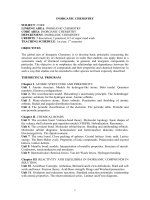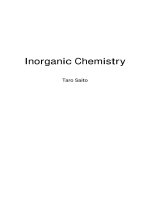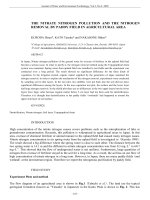Cupric nitrate SDS ENGISH CHEMISTRY
Bạn đang xem bản rút gọn của tài liệu. Xem và tải ngay bản đầy đủ của tài liệu tại đây (482.57 KB, 8 trang )
SAFETY DATA SHEET
1. Identification
Product identifier
COPPER NITRATE TECHNICAL AND REAGENT
Other means of identification
Product code
1266,1732
Synonym(s)
Copper (II) Nitrate, Trihydrate (CAS# 10031-43-3) * Cupric Nitrate, Anhydrous (CAS# 3251-23-8)
Recommended use
Not available.
Recommended restrictions
None known.
Manufacturer/Importer/Supplier/Distributor information
Manufacturer
Manufacturer / Supplier:
Address:
Telephone:
Fax:
Emergency USA:
Emergency International:
Emergency EU
The Shepherd Chemical Company
4900 Beech Street
Norwood, Ohio 45212 USA
513-731-1110
513-731-2151
CHEMTREC: 800-424-9300
CHEMTREC: 00 1 703-527-3887
+112
Distributed
by
The
Science
Company
7625
W
Hampden
Ave,
#14
Lakewood
CO
80227
Ph:
303-‐777-‐3777
Cat.
No.
NC-‐0303,
NC-‐7972,
NC-‐10229
2. Hazard(s) identification
Physical hazards
Oxidizing solids
Category 2
Health hazards
Acute toxicity, oral
Category 4
Skin corrosion/irritation
Category 2
Serious eye damage/eye irritation
Category 2A
Hazardous to the aquatic environment, acute
hazard
Category 1
Hazardous to the aquatic environment,
long-term hazard
Category 1
Environmental hazards
OSHA defined hazards
Not classified.
Label elements
Signal word
Danger
Hazard statement
May intensify fire; oxidizer. Harmful if swallowed. Causes skin irritation. Causes serious eye
irritation. Very toxic to aquatic life. Very toxic to aquatic life with long lasting effects.
Precautionary statement
Prevention
Keep away from heat. Take any precaution to avoid mixing with combustibles. Wash thoroughly
after handling. Do not eat, drink or smoke when using this product. Avoid release to the
environment. Wear protective gloves/eye protection/face protection.
Response
If swallowed: Call a poison center/doctor if you feel unwell. If on skin: Wash with plenty of water. If
in eyes: Rinse cautiously with water for several minutes. Remove contact lenses, if present and
easy to do. Continue rinsing. Specific treatment (see this label). Rinse mouth. If skin irritation
occurs: Get medical advice/attention. If eye irritation persists: Get medical advice/attention. Take
off contaminated clothing and wash before reuse. In case of fire: Use appropriate media to
extinguish. Collect spillage.
Storage
Store away from incompatible materials.
Disposal
Dispose of contents/container in accordance with local/regional/national/international regulations.
Hazard(s) not otherwise
classified (HNOC)
None known.
Supplemental information
Not applicable.
3. Composition/information on ingredients
Mixtures
Material name: COPPER NITRATE TECHNICAL AND REAGENT
18626
Version #: 02
Revision date: 07-17-2014
Issue date: 07-15-2014
SDS US
1/8
Chemical name
Common name and synonyms
COPPER (II) NITRATE,
TRIHYDRATE
Cupric Nitrate, Anydrous (CAS# 3251-23-8)
CAS number
%
10031-43-3
100
*Designates that a specific chemical identity and/or percentage of composition has been withheld as a trade secret.
4. First-aid measures
Inhalation
Move to fresh air. Call a physician if symptoms develop or persist.
Skin contact
Wash with plenty of soap and water. If skin irritation occurs: Get medical advice/attention. Take off
contaminated clothing and wash before reuse.
Immediately flush eyes with plenty of water for at least 15 minutes. Remove contact lenses, if
present and easy to do. Continue rinsing. Get medical attention if irritation develops and persists.
Rinse mouth. IF SWALLOWED: Call a POISON CENTER or doctor/physician if you feel unwell.
Eye contact
Ingestion
Most important
symptoms/effects, acute and
delayed
Symptoms may include stinging, tearing, redness, swelling, and blurred vision. May cause redness
and pain.
Indication of immediate
medical attention and special
treatment needed
Provide general supportive measures and treat symptomatically. In case of shortness of breath,
give oxygen. Keep victim warm. Keep victim under observation. Symptoms may be delayed.
General information
In the case of accident or if you feel unwell, seek medical advice immediately (show the label
where possible). Ensure that medical personnel are aware of the material(s) involved, and take
precautions to protect themselves.
5. Fire-fighting measures
Suitable extinguishing media
Water fog. Foam. Dry chemical powder. Carbon dioxide (CO2).
Unsuitable extinguishing
media
None known.
Specific hazards arising from
the chemical
May intensify fire; oxidizer.
Special protective equipment
and precautions for firefighters
Firefighters must use standard protective equipment including flame retardant coat, helmet with
face shield, gloves, rubber boots, and in enclosed spaces, SCBA.
Fire-fighting
equipment/instructions
Specific methods
In the event of fire, cool tanks with water spray. Move containers from fire area if you can do so
without risk. For massive fire in cargo area, use unmanned hose holder or monitor nozzles, if
possible. If not, withdraw and let fire burn out.
Cool containers exposed to flames with water until well after the fire is out.
General fire hazards
May intensify fire; oxidizer.
6. Accidental release measures
Personal precautions,
protective equipment and
emergency procedures
Methods and materials for
containment and cleaning up
Environmental precautions
Keep unnecessary personnel away. Keep people away from and upwind of spill/leak. Keep out of
low areas. Wear appropriate protective equipment and clothing during clean-up. Do not touch
damaged containers or spilled material unless wearing appropriate protective clothing. Ventilate
closed spaces before entering them. Local authorities should be advised if significant spillages
cannot be contained. For personal protection, see section 8 of the SDS.
Eliminate all ignition sources (no smoking, flares, sparks, or flames in immediate area). Keep
combustibles (wood, paper, oil, etc.) away from spilled material. This material is classified as a
water pollutant under the Clean Water Act and should be prevented from contaminating soil or
from entering sewage and drainage systems which lead to waterways. Stop the flow of material, if
this is without risk. Collect spillage. Following product recovery, flush area with water. For waste
disposal, see section 13 of the SDS.
Avoid release to the environment. Contact local authorities in case of spillage to drain/aquatic
environment. Prevent further leakage or spillage if safe to do so. Do not contaminate water. Avoid
discharge into drains, water courses or onto the ground.
7. Handling and storage
Precautions for safe handling
Keep away from heat. Take any precaution to avoid mixing with combustibles. Do not taste or
swallow. Avoid contact with skin. Avoid contact with eyes. Avoid prolonged exposure. Avoid
contact with clothing. Provide adequate ventilation. Wear appropriate personal protective
equipment. Observe good industrial hygiene practices. When using, do not eat, drink or smoke.
Wash hands thoroughly after handling. Avoid release to the environment. Do not empty into
drains.
Conditions for safe storage,
including any incompatibilities
Keep away from heat. Store in original tightly closed container. Store in a cool, dry place out of
direct sunlight. Store away from incompatible materials (see Section 10 of the SDS). Do not store
near combustible materials.
Material name: COPPER NITRATE TECHNICAL AND REAGENT
18626
Version #: 02
Revision date: 07-17-2014
Issue date: 07-15-2014
SDS US
2/8
8. Exposure controls/personal protection
Occupational exposure limits
US. OSHA Table Z-1 Limits for Air Contaminants (29 CFR 1910.1000)
Components
Type
Value
Percent
Form
COPPER (II) NITRATE, TRIHYDRATE (10031-43-3)
PEL
1 mg/m3
100%
(as Cu) Dust and mist.
Components
Type
Value
Percent
Form
COPPER (II) NITRATE, TRIHYDRATE (10031-43-3)
TWA
1 mg/m3
100%
(as Cu) Dust and mist.
Components
Type
Value
Percent
Form
COPPER (II) NITRATE, TRIHYDRATE (10031-43-3)
TWA
1 mg/m3
100%
(as Cu) Dust and mist.
US. ACGIH Threshold Limit Values
US. NIOSH: Pocket Guide to Chemical Hazards
Biological limit values
No biological exposure limits noted for the ingredient(s).
Appropriate engineering
controls
Good general ventilation (typically 10 air changes per hour) should be used. Ventilation rates
should be matched to conditions. If applicable, use process enclosures, local exhaust ventilation,
or other engineering controls to maintain airborne levels below recommended exposure limits. If
exposure limits have not been established, maintain airborne levels to an acceptable level. Eye
wash facilities and emergency shower must be available when handling this product.
Individual protection measures, such as personal protective equipment
Wear eye/face protection. Wear safety glasses with side shields (or goggles).
Eye/face protection
Skin protection
Hand protection
Wear appropriate chemical resistant gloves.
Wear appropriate chemical resistant clothing.
Other
Respiratory protection
In case of insufficient ventilation, wear suitable respiratory equipment.
Thermal hazards
Wear appropriate thermal protective clothing, when necessary.
General hygiene
considerations
When using, do not eat, drink or smoke. Always observe good personal hygiene measures, such
as washing after handling the material and before eating, drinking, and/or smoking. Routinely
wash work clothing and protective equipment to remove contaminants.
9. Physical and chemical properties
Appearance
Physical state
Solid.
Form
Solid.
Blue.
Color
Odor
Slight nitric acid odor.
Odor threshold
Not available.
pH
Not available.
Melting point/freezing point
491 °F (255 °C) estimated
Initial boiling point and boiling
range
Not available.
Flash point
Not available.
Evaporation rate
Not available.
Flammability (solid, gas)
Not available.
Upper/lower flammability or explosive limits
Not available.
Flammability limit - lower
(%)
Flammability limit - upper
(%)
Not available.
Explosive limit - lower (%)
Not available.
Explosive limit - upper (%)
Not available.
Vapor pressure
0 hPa estimated
Vapor density
Not available.
Relative density
Not available.
Material name: COPPER NITRATE TECHNICAL AND REAGENT
18626
Version #: 02
Revision date: 07-17-2014
Issue date: 07-15-2014
SDS US
3/8
Solubility(ies)
Solubility (water)
Not available.
Partition coefficient
(n-octanol/water)
Not available.
Auto-ignition temperature
Not available.
Decomposition
temperature
Not
available.
Viscosity
Not available.
Loose Packing Density
Not available.
10. Stability and reactivity
Reactivity
The product is stable and non-reactive under normal conditions of use, storage and transport.
Chemical stability
Material is stable under normal conditions.
Possibility of hazardous
reactions
Hazardous polymerization does not occur.
Conditions to avoid
Excessive heat. Contact with incompatible materials.
Incompatible materials
Incompatible with easily oxidizable materials.
Hazardous decomposition
products
No hazardous decomposition products are known.
11. Toxicological information
Information on likely routes of exposure
Harmful if swallowed.
Ingestion
Inhalation
Prolonged inhalation may be harmful.
Skin contact
Causes skin irritation.
Eye contact
Causes serious eye irritation.
Symptoms related to the
physical, chemical and
toxicological characteristics
Symptoms may include stinging, tearing, redness, swelling, and blurred vision. Skin irritation. May
cause redness and pain.
Information on toxicological effects
Harmful if swallowed.
Acute toxicity
Components
Species
Test Results
COPPER (II) NITRATE, TRIHYDRATE (CAS 10031-43-3)
Acute
Oral
LD50
Rat
940 mg/kg
* Estimates for product may be based on additional component data not shown.
Causes skin irritation.
Skin corrosion/irritation
Serious eye damage/eye
irritation
Causes serious eye irritation.
Respiratory or skin sensitization
Not available.
Respiratory sensitization
Skin sensitization
This product is not expected to cause skin sensitization.
Germ cell mutagenicity
No data available to indicate product or any components present at greater than 0.1% are
mutagenic or genotoxic.
Carcinogenicity
This product is not considered to be a carcinogen by IARC, ACGIH, NTP, or OSHA.
Reproductive toxicity
This product is not expected to cause reproductive or developmental effects.
Specific target organ toxicity single exposure
Not classified.
Specific target organ toxicity repeated exposure
Not classified.
Aspiration hazard
Not available.
Chronic effects
Prolonged inhalation may be harmful.
12. Ecological information
Ecotoxicity
Very toxic to aquatic life with long lasting effects. Accumulation in aquatic organisms is expected.
Material name: COPPER NITRATE TECHNICAL AND REAGENT
18626
Version #: 02
Revision date: 07-17-2014
Issue date: 07-15-2014
SDS US
4/8
Product
Species
COPPER (II) NITRATE, TRIHYDRATE (CAS Mixture)
Crustacea
EC50
Daphnia
Fish
LC50
Components
Test Results
0.2877 mg/l, 48 hoursestimated
Fish
0.917 mg/l, 96 hoursestimated
Species
Test Results
COPPER (II) NITRATE, TRIHYDRATE (CAS 10031-43-3)
Aquatic
Crustacea
EC50
Water flea (Moina dubia)
0.037 - 0.044 mg/l, 48 hours
Fish
LC50
Winter flounder (Pleuronectes
americanus)
0.057 - 0.1061 mg/l, 96 hours
* Estimates for product may be based on additional component data not shown.
No data is available on the degradability of this product.
Persistence and degradability
Bioaccumulative potential
No data available.
Mobility in soil
No data available.
Other adverse effects
No other adverse environmental effects (e.g. ozone depletion, photochemical ozone creation
potential, endocrine disruption, global warming potential) are expected from this component.
13. Disposal considerations
Disposal instructions
Local disposal regulations
Collect and reclaim or dispose in sealed containers at licensed waste disposal site. This material
and its container must be disposed of as hazardous waste. Do not allow this material to drain into
sewers/water supplies. Do not contaminate ponds, waterways or ditches with chemical or used
container. Dispose of contents/container in accordance with local/regional/national/international
regulations.
Dispose in accordance with all applicable regulations.
Hazardous waste code
The waste code should be assigned in discussion between the user, the producer and the waste
disposal company.
Waste from residues / unused
products
Dispose of in accordance with local regulations. Empty containers or liners may retain some
product residues. This material and its container must be disposed of in a safe manner (see:
Disposal instructions).
Empty containers should be taken to an approved waste handling site for recycling or disposal.
Since emptied containers may retain product residue, follow label warnings even after container is
emptied.
Contaminated packaging
14. Transport information
DOT
UN number
UN proper shipping name
Transport hazard class(es)
Class
Subsidiary risk
Label(s)
Packing group
Environmental hazards
Marine pollutant
Special precautions for user
Special provisions
Packaging exceptions
Packaging non bulk
Packaging bulk
DOT BULK
UN number
UN proper shipping name
Transport hazard class(es)
Class
Subsidiary risk
Label(s)
Packing group
Environmental hazards
Marine pollutant
Special precautions for user
Special provisions
Packaging exceptions
UN1477
NITRATES, INORGANIC, N.O.S. (CUPRIC NITRATE), MARINE POLLUTANT
5.1
5.1
III
Yes
Read safety instructions, SDS and emergency procedures before handling.
IB8, IP3, T1, TP33
152
213
240
UN1477
NITRATES, INORGANIC, N.O.S. (CUPRIC NITRATE RQ = 100 LBS)
5.1
5.1
III
Yes
Read safety instructions, SDS and emergency procedures before handling.
62, IB5, IP1
None
Material name: COPPER NITRATE TECHNICAL AND REAGENT
18626
Version #: 02
Revision date: 07-17-2014
Issue date: 07-15-2014
SDS US
5/8
Packaging non bulk
Packaging bulk
IATA
UN number
UN proper shipping name
Transport hazard class(es)
Class
Subsidiary risk
Label(s)
Packing group
Environmental hazards
ERG Code
Special precautions for user
Other information
Passenger and cargo
aircraft
Cargo aircraft only
IMDG
UN number
UN proper shipping name
Transport hazard class(es)
Class
Subsidiary risk
Packing group
Environmental hazards
Marine pollutant
EmS
Special precautions for user
Transport in bulk according to
Annex II of MARPOL 73/78 and
the IBC Code
211
242
UN1477
NITRATES, INORGANIC, N.O.S. (CUPRIC NITRATE)
5.1
5.1
III
yes
5L
Read safety instructions, SDS and emergency procedures before handling.
Forbidden.
Allowed.
UN1477
NITRATES, INORGANIC, N.O.S. (CUPRIC NITRATE), MARINE POLLUTANT
5.1
III
Yes
F-A, S-F
Read safety instructions, SDS and emergency procedures before handling.
Not applicable.
DOT
DOT BULK; IATA; IMDG
Marine pollutant
Material name: COPPER NITRATE TECHNICAL AND REAGENT
18626
Version #: 02
Revision date: 07-17-2014
Issue date: 07-15-2014
SDS US
6/8
15. Regulatory information
US federal regulations
This product is a "Hazardous Chemical" as defined by the OSHA Hazard Communication
Standard, 29 CFR 1910.1200.
TSCA Section 12(b) Export Notification (40 CFR 707, Subpt. D)
Not regulated.
CERCLA Hazardous Substance List (40 CFR 302.4)
COPPER (II) NITRATE, TRIHYDRATE (CAS 10031-43-3) LISTED
US. OSHA Specifically Regulated Substances (29 CFR 1910.1001-1050)
Not listed.
Superfund Amendments and Reauthorization Act of 1986 (SARA)
Immediate Hazard - Yes
Hazard categories
Delayed Hazard - No
Fire Hazard - Yes
Pressure Hazard - No
Reactivity Hazard - No
No
SARA 302 Extremely
hazardous substance
SARA 311/312 Hazardous
chemical
Yes
SARA 313 (TRI reporting)
Chemical name
COPPER COMPOUNDS N100
NITRATE COMPOUNDS (WATER DISSOCIABLE)
N511
CAS number
% by wt.
10031-43-3
100
100
Other federal regulations
Clean Air Act (CAA) Section 112 Hazardous Air Pollutants (HAPs) List
Not regulated.
Clean Air Act (CAA) Section 112(r) Accidental Release Prevention (40 CFR 68.130)
Not regulated.
Safe Drinking Water Act
(SDWA)
Not regulated.
US state regulations
US. Massachusetts RTK - Substance List
COPPER (II) NITRATE, TRIHYDRATE (CAS 10031-43-3)
US. New Jersey Worker and Community Right-to-Know Act
500 LBS
US. Pennsylvania RTK - Hazardous Substances
COPPER (II) NITRATE, TRIHYDRATE (CAS 10031-43-3)
US. Rhode Island RTK
US. California Proposition 65
California Safe Drinking Water and Toxic Enforcement Act of 1986 (Proposition 65): This material is not known to contain
any chemicals currently listed as carcinogens or reproductive toxins.
International Inventories
Country(s) or region
Australia
Inventory name
Australian Inventory of Chemical Substances (AICS)
On inventory (yes/no)*
Yes
Canada
Domestic Substances List (DSL)
Yes
Canada
Non-Domestic Substances List (NDSL)
No
China
Inventory of Existing Chemical Substances in China (IECSC)
Yes
Europe
European Inventory of Existing Commercial Chemical
Substances (EINECS)
Yes
Europe
European List of Notified Chemical Substances (ELINCS)
Japan
Inventory of Existing and New Chemical Substances (ENCS)
Yes
Korea
Existing Chemicals List (ECL)
Yes
New Zealand
New Zealand Inventory
Yes
Philippines
Philippine Inventory of Chemicals and Chemical Substances
(PICCS)
Yes
United States & Puerto Rico
Toxic Substances Control Act (TSCA) Inventory
Yes
No
*A "Yes" indicates that all components of this product comply with the inventory requirements administered by the governing country(s)
A "No" indicates that one or more components of the product are not listed or exempt from listing on the inventory administered by the governing
country(s).
Material name: COPPER NITRATE TECHNICAL AND REAGENT
18626
Version #: 02
Revision date: 07-17-2014
Issue date: 07-15-2014
SDS US
7/8
16. Other information, including date of preparation or last revision
Issue date
07-15-2014
Revision date
07-17-2014
Version #
02
Disclaimer
ALTHOUGH THE INFORMATION AND RECOMMENDATIONS SET FORTH HEREIN
(HEREINAFTER "INFORMATION") ARE PRESENTED IN GOOD FAITH AND BELIEVED TO BE
CORRECT AS OF THE DATE HEREOF, THE SHEPHERD CHEMICAL COMPANY MAKES NO
REPRESENTATIONS AS TO THE COMPLETENESS OR ACCURACY THEREOF.
INFORMATION IS SUPPLIED UPON THE CONDITION THAT THE PERSONS RECEIVING SAME
WILL MAKE THEIR OWN DETERMINATION AS TO ITS SUITABILITY FOR THEIR PURPOSES
PRIOR TO USE. IN NO EVENT WILL THE SHEPHERD CHEMICAL COMPANY BE
RESPONSIBLE FOR DAMAGES OF ANY NATURE WHATSOEVER RESULTING FROM THE
USE OF OR RELIANCE UPON INFORMATION. NO REPRESENTATIONS OR WARRANTIES,
EITHER EXPRESSED OR IMPLIED, OR MERCHANTABLITY, FITNESS FOR A PARTICULAR
PURPOSE OR OF ANY OTHER NATURE ARE MADE HEREUNDER WITH RESPECT TO
INFORMATION OR THE PRODUCT TO WHICH INFORMATION REFERS. The information in the
sheet was written based on the best knowledge and experience currently available.
Transport Information: Material Transportation Information
Revision Information
Material name: COPPER NITRATE TECHNICAL AND REAGENT
18626
Version #: 02
Revision date: 07-17-2014
Issue date: 07-15-2014
SDS US
8/8









